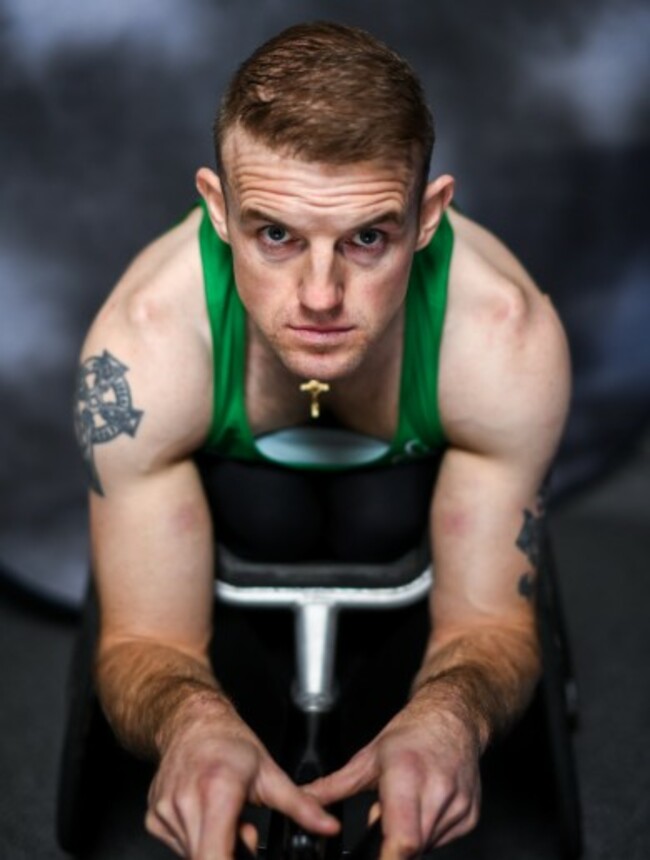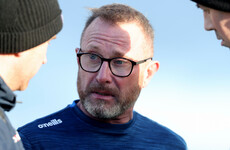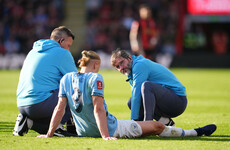I WAS JUST a typical 21-year-old. Big into Gaelic football, my family would have been big into it. I played my last match on the Saturday night. My Dad actually reffed that, he was an inter-county referee.
I was an apprentice plumber. I was going to work on the Monday morning, I was driving too fast and lost control of the car. Here I am now so… I’m lucky to be here.
***
Patrick Monahan’s memory of the day itself is crystal clear.
It’s coming up to 15 years since the life-changing accident now, but he can recall every single detail. Vividly.
“I remember it all like yesterday, I don’t think I’ll ever forget,” the Kildare wheelchair racer tells The42, exactly six months out from his potential second Paralympic Games.
“Not that I’m traumatised by it, it’s a good thing that I remember it in some ways. I just remember being nearly…. I know it sounds funny now, but embarrassed. The car was obviously upside down. I was like, ‘I’ve done it again,’ because I had had a previous worse crash probably, just from speeding.
“I remember thinking: if I can get out of the car and topple it back over, could I continue going to work? I know that sounds funny… I remember there was blood everywhere, and I was squashed up against the door. I was probably in the car for like a half-an-hour before they actually tried to move me away from the door.
I didn’t realise that there was a problem with paralysis or anything like that. I hadn’t even tried to move. I wasn’t even in that much pain even though I was, like. It was the shock.
“It was only when I tried to move that the pain kind of kicked in and everything else… it was just kind of shocking. A local guy was trying to keep me conscious. I probably would have lost consciousness if not. I remember it well, yeah.”
Returning to that fateful day, and reliving every moment and memory, must be difficult, but Monahan takes it all in his stride.
Sometimes in interviews, you can see the pain etched all over the interviewee’s face as they recall tragic personal experiences. But Monahan’s demeanor remains the same.
That’s life. He has accepted it.
On with the recount he goes. To Naas Hospital, and the chaos there.
“That day was very traumatic. I didn’t know what was going on and I was in an awful lot of pain. I remember getting my first dose of morphine and it was like an instant hit. Family and all my friends were in. I didn’t know what was going on with me.
“I remember going in for surgery that evening. I would have tried to get a helicopter to take me to the Mater but there was none available. I had to wait all day in A&E in Naas until seven or eight that night. They brought me up when the traffic had surpassed so it would be a smooth journey for my back.
I didn’t know at the time the extent of my injuries. I just remember asking the surgeon would I walk again, and she was like, ‘Well you have a chance, but there was a lot of damage done there… you can never say never.’ It was probably when I woke up, and came around [after the surgery] that it kind of hit.
Yes, it hit. Kind of. But in the immediate aftermath, he was fairly optimistic.
The first few days are a blur, but the weeks that followed were positive.
“Long-term paralysis, I don’t know what I was thinking but I didn’t think that that would be a thing for me,” the 34-year-old conceded. “For five or six weeks, I still… I don’t know whether I had my hopes up or was being optimistic, but I didn’t think that it would be a long-term thing for me.
“It was probably after five or six weeks that I realised that maybe things aren’t going to get better, like. I had to start thinking that life could be different.”
21. Feeling invincible. And to have so much taken away, just like that.
There was always hope, though. As the surgeon said, ‘You can never say never.’
At that moment, he cracks a slight smile.
“I’m lucky and unlucky, I suppose. It could have been a lot worse as well.
“Obviously it’s a life-changing injury but… my head had gone through the window and my ear was hanging off… I’m lucky that my temporal [was okay], that I didn’t have brain damage or anything worse. Once I had my head I’d be alright anyway.”
But mentally, of course, it was extremely challenging, in many different ways.
Coming to terms with how different life was, and adjusting to this massive change was difficult.
“That was tough,” Monahan nods. “That’s where the sport probably helped me a lot. I went back to work very quick, and it kind of helped but where I struggled was being out and about nearly.
I wouldn’t be seen nearly in my village or my community because I didn’t want people to see me this way. I wanted them to remember me, the person before.
“I just avoided people in my area nearly for a while. I would have started going back out and socialising but that was tough as well. You feel that you’re isolated, that you’re the only person… you’re different or something like that.
“It took time. But lucky, I had good support and that. It’s coming up on 13 years now, but for a long time now, it’s just been normal like. I never look back, wishing that it didn’t happen. It generally doesn’t bother me.
“I’m lucky that I’m at a decent level and I’m independent.”
The day before we speak, Monahan was discussing that period of his life with others at work in the National Rehabilitation Hospital [NRH] in Dún Laoghaire, where he stayed for three months after the fracture damage to three thoraic vertebrae and broken ribs. Now, he partakes in patient education and shares his experience with others there.
He’s keen to focus on the positives in life.
A fully-accomplished and top-level wheelchair athlete, Monahan has since won back-to-back Dublin Marathons, the 2015 Columbus Ohio Marathon — breaking the Irish record by seven minutes there — and finished 16th at Rio 2016.
The decision to get back into sport came from both himself, and others. Family and friends were hugely encouraging.
“I still have the same friends now,” he smiles, “I was never treated any differently, and family the same.
“It was probably family more like, I was always big into sport. Now they wouldn’t have pushed it on me, but I know they would have liked for me to get back involved in some sort of sport.
“It was in my mind for a long time… you go out at the weekend, you’re hungover on a Sunday, and you’re just like, ‘Ugh, I’m going to get involved in sport.’ That just built up that I was like, ‘I have to try it.’
The way I looked at it, I didn’t intentionally set out that morning to damage myself, let’s say, but it was kind of selfish of me in some ways. You don’t think of how it affects every one else.
“I was in hospital for nearly six months, and everyone else has to get back on with things; work, college, school or whatever. They’re coming up to see you, they’re coming to terms with what’s happened to you as well; they’re doing all the work in the background where I’m trying to get my independence back.
“I probably wouldn’t have even seen a lot of the things that they would have had to do in the background. It was probably for them more than me, and that’s probably what motivates me now.
“There’s days that you don’t want to train, the weather’s crap and that’s kind of why I do it. I don’t enjoy it a lot of the time because it’s really tough and it can be isolating as well, there’s days that you’re so tired you don’t want to train but I use that as a motivating factor.”
One summer changed everything then in Monahan’s sporting life. Wheelchair racing came on his radar.
Again, he remembers it as clear as day.
“I seen it at London 2012, I seen David Weir winning four gold medals in front of 80,000 people,” he beams, with a nod to the Paralympic Games. “I was like, ‘That looks pretty cool!’ It was a lot tougher than I thought it would be when I actually got involved.
“You’re offered to try out basketball, but I was never into basketball so I was like, ‘I’m not just gonna go playing basketball because I’m in a wheelchair.’ I saw that, and I got on to the Irish Wheelchair Association and asked was there a chair that I could even try and give it a go.
I got a [racing] chair and there was that whole thing of my public image. That was six years after my accident, and I still didn’t want to be seen as such.
“I had kind of come to terms with being seen in this chair,” he adds, looking down to his standard manual wheelchair. “This was, again, something different.”
So one Saturday, he and his friends headed to Punchestown Racecourse, and that’s where it all really started. There weren’t too many people there, so Monahan happily set out to try and push his new racing chair around.
He hasn’t looked back since.
“I just got the confidence to go out and do it more in public, and took it from there. The Irish Wheelchair Association gave me a loan of a chair in 2013, and I have a GB coach since 2014.
“I’m lucky that things have fallen into place because if I didn’t meet him, I probably would have just went back to work — I wouldn’t have been able to get anywhere without him. There’s no one really in Ireland that could coach me.
“I’ve been lucky along the way.”
The racing chair came in June 2013, and he completed his first marathon that October.
This was even before he had a coach or anything, he was just going out doing long pushes and asked the Irish Wheelchair Association what else he could do: Give Dublin Marathon a go.
“I said, ‘Sure look, I’ll go up and give it a lash like!’ It nearly killed me so it did,” he laughs. “But it gave me great confidence as well like, ‘Jesus, I’ve actually finished it.’
“I think I was back out within a few days after recovering from it. That really helped me. I think it was good that I done that that year, even though I probably wasn’t prepared for it, it actually helped me move on kind of.
Yeah, that was a big turning point in my life as well. I thought sport was gone for me. I wasn’t going back playing Gaelic football. To be able to finish the marathon, it was like, ‘Jesus, I can do something in sport.’
“I got involved in it just to get fit and that, but I always had it in the back of my mind, I was always competitive and that. I was hoping that I could get to a decent level.”
Once he got a taste, he wanted more.
Momentum built and built.
“It’s difficult at the start but also, you’re knocking massive chunks off your time so it’s like, ‘Ah, this is easy, like!’ and that type of thing. Then you’re meeting other people as well and it was giving me confidence.”
He remembers his coach, Ian Mirfin, encouraging him to compete at a half-marathon in Lisbon, and was being the first time he travelled alone until he was met in the Portuguese capital’s airport: “It made me challenge myself outside my comfort zone and out of the sport, and it still does now. That helped as well.”
“It’s completely different, like,” Monahan continues, casting his mind back to his GAA days. “There’s benefits and there’s downsides.
I train alone, I’m part of the gym so you’re isolated a lot. In some ways, I don’t think that’s healthy, like. There’s days when the weather’s really bad, you go to the park and you’re the only one around; it starts playing on your mind: ‘What am I doing?’
“I like the individual side of the sport because what I put into it, I can get out of it whereas team sports were great back then. It is challenging, yeah.
“I played Gaelic football at a decent level, but I wouldn’t have had to have been as regimental with stuff that I have to do now; nutrition, sleep and recovery is just as important. Back then, you trained, played football and go out and socialise.
“I don’t really do that. The drinking days are gone and going out and things like that. It’s a lot more disciplined. But I do like that I can kind of control it to a certain degree where it’s not a team sport. But you’d like that team environment as well, it would be handy if I had a few people to train with from time to time.
“But ah no, I can’t complain… it’s coming up to 13 years now, and I didn’t see that for me back then.”
All he sees right now is Tokyo, and the Paralympic Games in August. 2020 vision and all of that. His schedule at the minute isn’t just as hectic as usual, after a recent “solid” marathon in Dubai.
“I’m in a heavy block so I’m quite tired,” he explains. “April is when I’ll have key events.
“I’m doing the Manchester marathon, that’s just a low-key one with a couple of good guys. I do the majors every year so I’ll have Boston and London back-to-back within six days of each other, the standard will be really high but London is not necessarily a quick marathon, it’s kind of like Dublin. It will be about placing there more than a time.
I set a really good time last year, I got a big PB so that’s put me in a really strong position. I’ve done what I can but it comes down to slots. We’ll know more in June but I’d be very confident that I’ll be fine.
“It’s just them three marathons and then I have one in June as well. Other than that, it’s just training and trying to keep the body healthy and that.”
So all eyes on August and the dream there.
“That’s it, yeah,” Monahan concludes with a smile. He’s lucky to just be here, after all.
The42 is on Instagram! Tap the button below on your phone to follow us!















Way to get on with life. Best of luck in Tokyo!
Best of luck Patrick in you’re quest to get to Tokyo. The Irish wheelchair association does so much work to encourage people to get involved in sport. Great especially for young kids
A great read, Patrick is very inspiring and full of positivity,, I wish him all the best and something tells me we will be hearing alot more of him in the future.
Patrick your a legend and a huge inspiration to Oisín and other athletes
Great honest read, no excuses, no ifs or buts. Just what happened and how he deals with it. Glad I read that.
Your a ray of sunshine on a wet windy day. Bestof luck and joy in what’s to come.
Best of luck in the Olympics! You’re inspirational.